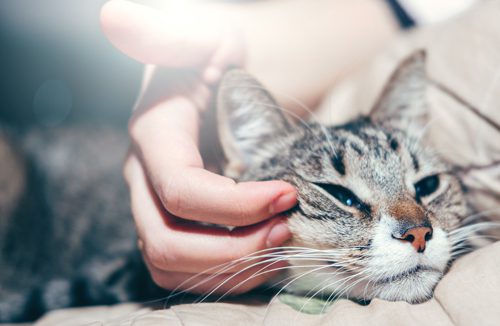
The exchange of love between an animal and its human companion is a powerful thing.
So powerful, in fact, that numerous studies support the use of pet therapy for a variety of conditions. This includes:
- Addiction recovery
- Anxiety
- Autism
- Chemotherapy
- Chronic heart failure
- Depression
- Elder loneliness
- Mood disorder
- Post-traumatic stress disorder (PTSD)
- Stroke
How is this possible? In a story for National Public Radio (NPR), Dr. Rebecca Johnson of the Research Center for Human-Animal Connection at the University of Missouri College of Veterinary Medicine indicated that a crucial hormone for healing, oxytocin, increases when we engage with animals. “That is very beneficial for us,” Johnson told NPR. “Oxytocin helps us feel happy and trusting.”
Often referred to as the “love hormone,” oxytocin is a neurotransmitter in the brain is considered to help alleviate depressive feelings and facilitate better pair bonding. In her interview with NPR, Johnson said that oxytocin helps “the body to be in a state of readiness to heal.” Through her Center, Johnson initiated a number of pet therapy programs for special populations such as senior citizens, veterans suffering with PTSD, and children with autism.
How Pet Therapy Helps People in Recovery
Pet therapy, also referred to as animal-assisted therapy (AAT), is gaining respect as an evidence-based modality to be included in a comprehensive substance abuse treatment plan.
AAT uses a variety of creatures, including dogs, cats, horses, rabbits, guinea pigs, birds—even miniature pigs!
Simply petting an animal induces automatic relaxation. More specifically, according to UCLA Health, animal interaction releases powerful hormones such as oxytocin, serotonin, prolactin, and phenylethylamine, all of which help elevate mood, provide comfort, and reduce pain.
Some studies indicate that group therapy sessions are more effective with the presence of a therapy animal. Other studies reference that AAT allows for increased opportunities for individuals to explore their past; be more upfront with thoughts, behaviors, and emotions; uncover negative coping mechanisms; and establish new methods and choices for sobriety.
Equine therapy in treatment centers is a proven method for helping people in recovery build better relationships, work through trauma, and learn to be present. A pilot study at Georgia State University’s School of Public Health reported positive results when mental health professionals use dogs to help students relieve feelings of loneliness and anxiety—sometimes reducing symptoms by more than 50 percent.
Much of the success of AAT has to do with trust. It’s often harder for someone in treatment for drug or alcohol abuse to accept the intentions of counselors and other people in a new environment. Because therapy animals help create a sense of calm, this allows an individual to release stress and be more open to other techniques for handling difficult emotions. Animals can often sense when someone feels uneasy, and provide support through a challenging circumstance.
Gaining Access to Pet Therapy
Not all substance abuse facilities offer ATT, but there are other ways you can receive the benefits of unconditional love, loyalty, and support from all sorts of creatures when you leave treatment.
- Get a pet of your own. Nearly eight million dogs and cats are deposited at animal shelters each year. Imagine being the person who could provide a loving home to one of these creatures. Yes, it’s a lot of responsibility, but caring for another living creature reduces depression and provides moments of joy.
- Another interesting fact: emotional support dogs are now protected by federal law to help people find companionship and affection and deal with physical and mental issues.
- Foster an animal. For a variety of reasons, many critters need a temporary home that provides safe shelter. Helping during this transition is a wonderful way to experience the benefits of animal attention and provide a peaceful environment for these animals. There are many organizations that accept volunteers for this important duty, such as Georgia Homeless Pets or your state’s SPCA.
- Volunteer at a rescue center. Channel your loving kindness into assisting the people and the animals at a shelter. This activism also enhances your sense of purpose and helps create a sense of community. This type of pet therapy also expands on your ability to recognize another creature’s pain and do what you can to alleviate it—often a powerful aspect of moving forward in your life after addiction.
- Volunteer on a farm. Often horse training facilities, sanctuary farms, wildlife centers, and zoos need a helping hand to do the mucky-muck work of tending to animals’ daily needs. For example, Aware Wildlife Center in Georgia helps nearly 2,000 creatures a year in need of rehabilitation due to injury or that were orphaned. It often needs help with feeding animals, tending to their living spaces, and preparing meals, among other duties.
It’s a rare and beautiful thing to make a true connection with an animal, but it could be a key component in your long-lasting recovery.

